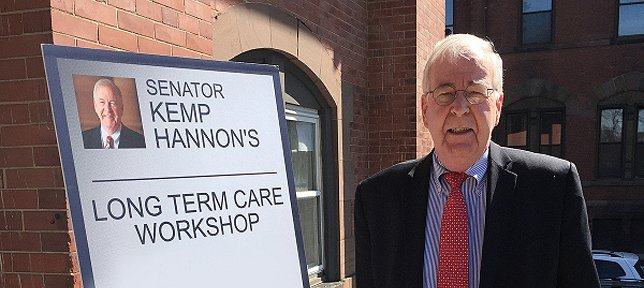New York, NY - April 20, 2017 - New York State Senate Health Committee Chairman Kemp Hannon led a bipartisan push for a key budget measure that will help save the lives of premature infants. Pasteurized donor human milk (PDHM) helps prevent high risk infants from dying of necrotizing enterocolitis (NEC) - a sudden-onset intestinal disease – and many other health complications that typically afflict this vulnerable population. “When a mother’s milk is not available, PDHM is the next best option to give these babies a fighting chance. Increased use of PDHM will prevent NEC, decrease hospital stays, prevent infections that could lead to feeding intolerance and potential lifelong intestinal problems and developmental disabilities, and most importantly, decrease mortality rates amongst these fragile infants,” explained Senator Hannon.
Last year, Hannon’s bill (S6583B) authorizing Medicaid coverage for PDHM passed unanimously in both the Senate and Assembly, but was vetoed by the Governor with language directing the issue to be brought up as part of a state budget. The Senate included this provision in its one-house budget and fought for its inclusion in the final enacted budget. Unfortunately, at a cost of two-to-three times higher than formula, PDHM is unaffordable for many families who would benefit from it. Requiring Medicaid to cover PDHM, when determined necessary by a physician for premature babies, will end up saving the state considerable Medicaid dollars since critically ill, very low birthweight, premature infants constitute the majority of the total Medicaid budget for neonatal care.
Dr. Shetal Shah, MD, FAAP, Neonatologist at Maria Fareri Children’s Hospital at Westchester Medicaid Center, said, “Offering donor breast milk to New York State's tiniest babies through Medicaid reduces a significant health disparity.”
Senator Hannon said, “The Department of Health has long acknowledged the benefits of breastfeeding and has recently enacted regulations to further promote breastfeeding. Ensuring our most fragile infants have access to PDHM when in the NICU and the mother’s milk is not an option is the next step in promoting the lifelong benefits of breast milk. While a number of hospitals such as Crouse Hospital and Westchester Medical Center offer donor breast milk to premature babies, which can often be lifesaving, coverage continues to be an obstacle.”
Dr. Boriana Parvez, MD, IBCLC, FAAP, Neonatologist at Maria Fareri Children’s Hospital at Westchester Medical Center and Development Director at the New York Milk Bank, said, “Donor milk is a precious gift of life to the tiniest and most fragile newborn babies. It is the safest and the most natural way to nourish them when their mother's milk is in insufficient quantity. We often say that having a preemie in the NICU is like being on a roller coaster ride but without the thrill. Having to worry about the additional cost of donor milk only further hinders the mothers of preemies’ efforts to care for their tiny babies and produce milk. As a physician caring for sick premature infants, I feel that donor milk should be covered by insurance and I stand behind our politicians who are trying to make it a reality.”
This provision takes effect July 1, 2017.










